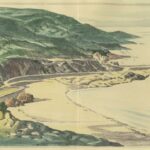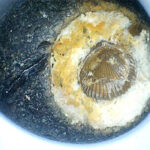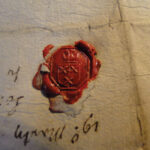Interview with Peter C George, Fellow of the Société Jersiaise Millennium Fund and DPhil candidate at Oxford University.
If you come from Jersey, you will likely know the frustration of trying to explain the cultural, political and historical uniqueness of our Island to someone who has never heard of it before. But there is no need to resort to quoting the same explainers we’ve repeated hundreds of times with someone like Peter George.
Although he hails from Devon, Peter is perhaps more knowledgeable about Jersey than many locals since writing in the Island’s indigenous language became the focus of his academic research. Currently a DPhil candidate at the University of Oxford and recipient of the Société Jersiaise Millennium Fund Fellowship, Peter’s work focuses on the relationship between the local press and regional and local identities in France, England and Jersey in the late-nineteenth and early-twentieth centuries.
Though Peter has only visited the Island a handful of times, he has become incredibly familiar with the fascinating Jèrriais writings of Jersey journalists. I sat down with him to find out more about how newspapers were the original social media, the linguistic playfulness of Jersey’s indigenous language and how exactly he managed to teach himself Jèrriais…

Q: As someone who isn’t from Jersey originally, what drew you to Jèrriais as a language?
A: What has really drawn me to Jèrriais is how important the language has been in Island life. The period that I’m studying runs from the late 19th century to the Second World War, and one thing that constantly comes across is just how attached people were to Jèrriais at that time. Writing in Jèrriais was really popular – it was a regular feature in the Island’s newspapers and was very much in demand with readers. Booklets of Jèrriais stories sold thousands of copies and plays and variety performances in Jèrriais were sell-out events. Jersey at the time was very much a multilingual society, and people saw Jèrriais as having a special role as their own local idiom, alongside the Island’s official languages English and French.
Q: What light has your discovery of Jèrriais literature shed on your existing research on the way the local press has moulded regional and local identities in France and England?
A: Jersey is so interesting because the Island is very internationally connected and at the same time very much its own local place. Though the types of connections have changed over time, I think that this was as true in the period I’m studying as it is today.
The local press was very interactive in this period, and in Jersey it really shows us how people in the past talked about identity and what it meant to them. As today, people had many different identities which might matter to them in different ways, regional or local identities, national identities, and international connections. The local press in Jersey is full of discussions about this. For example, when there were debates about the use of English or French in the States or in church, people on both sides claimed that their view was the one that best fitted with Jersey’s identity, often combining this with a wider picture of the Island’s Norman heritage or its position in the British Empire. Jersey also reminds us how international connections can feed into a place’s identity: links with Britain and Normandy were key of course, but for a long time the Gaspé cod fishery and ties with Canada were an important part of Jersey identity. People in the Jersey diaspora in North America also subscribed to Jersey newspapers as a way of keeping in touch with their home Island. They also often sent letters back to the paper, one of these even tells us that Jèrriais was being spoken in Chicago at the time!

Q: It appears that the three prominent writers you focussed on in your recent talk at the Société all used their Jèrriais columns to provide a humorous and satirical lens on island life. Is there something about Jèrriais linguistically that lends itself to this playful tone? Or was it more the style of columnists at that time?
A: Because Jersey was a multilingual society, people used different languages for different things. Jèrriais was very much a spoken language, and plenty of people who wrote formally in English or French would have spoken Jèrriais in their everyday life. Because of this association, Jèrriais was often seen as more informal. As E.J. Luce pointed out at the time, there were different rules for what you could write in a Jèrriais article than in an English or French one! This meant that Jèrriais was particularly well-suited to playful writing, be this the gossip articles of George W. de Carteret or the comic and satirical tales of Philippe Le Sueur Mourant. There’s often an impression that Jèrriais writing offered Jersey people an opportunity to have fun in their own language. But at the same time, Jèrriais is very versatile. Luce used it for serious poetry as well as his satirical pieces, and if you look at the different authors on Les Pages Jèrriaises you can see a real variety of different types of writing from the nineteenth century to the present day.
Q: I understand that the recently digitised collection of Newspapers at the Société Jersiaise has proved helpful in your research. Could you tell me about how you have used this resource and what you have been able to discover by having online access to this collection?
A: The digitised newspapers of the Société are a really fantastic resource, not just for historians of Jersey but for anyone interested in the history of the press and its place in society. The newspapers don’t just provide a record of events but were a really important part of Island life at the time. The different newspapers in Jersey often took different views on events and engaged in debates with each other, and the press was the original social media. People wrote in to respond to events in the Island, give their opinion on the newspapers’ editorial lines, and debate with their fellow readers. Even the newspaper offices in town were important meeting places where people went to discuss news with each other and with journalists, take a pinch of snuff from the box on the office counter, and look at the impressive vegetables that farmers traditionally brought to display there.
The digitisation project is particularly valuable because it makes the newspapers so much more accessible. It’s now possible for me to use the digitised papers to cross reference events that I’ve found during my research in Jersey, and the search facility makes it easier to follow topics over multiple years or event decades.

Q: Can you tell me about the process of teaching yourself Jèrriais? How did you manage to master this minority language by yourself, and do you have any tips for others wanting to learn?
A: Like many people learning Jèrriais, I started out using Paul Birt’s grammar ‘Lé Jèrriais Pour Tous’. My ability to read the language still relies to an extent on my prior knowledge of French, but Jèrriais has the advantage of having a lot of literature online to practice reading, accessible through Les Pages Jèrriaises. I’d recommend them as a good way to find out about different writers and discover texts to enjoy in Jèrriais, from 19th century writers like the Bailiff Sir Robert Pipon Marett to today’s authors such as Geraint Jennings and Joan Tapley. To get more of a feel for the spoken language, I’d recommend listening to BBC Jersey’s La Lettre Jèrriaise, which is available online. On occasions when I’ve visited the Island, I’ve also been to the caqu’téthies organised by the Office du Jèrriais to hear the language and have a go at speaking it myself. I’ve always found them really interesting and welcoming events and would recommend them to anyone wanting to learn or practice Jèrriais, whatever their level.
Q: Do you have any particular favourite Jèrriais writers or writings that you have come across during your research?
A: The variety of writing in Jèrriais is one of the great attractions of the language, and so it’s hard to choose one writer. But I’d say my favourite is still Philippe Le Sueur Mourant. His Bram Bilo stories sold thousands of copies when they were first published, and they remain a great read today. Some of them were recently republished along with writing by Edwin Luce in the booklet Bram & Elie.

Q: Your research has been supported by the Société Jersiaise Millennium Fund. How has this assisted your studies, and would you recommend that other academics apply for this grant?
A: The Société Jersiaise Millennium Fellowship has been a great help. It has allowed me to pursue my work on Jersey history in greater depth and I’ll hopefully soon be publishing some of the fruits of this research, which I wouldn’t have had the freedom to do without the grant given by the Société. But beyond the financial support, receiving the grant from the Société has also given me the opportunity to come to Jersey and connect with people who are interested in my topics and can help me with my research; learn more about the Island in my conversations with them; and share some of my work in a public lecture.
Jersey is a fantastic place to study, both for its own rich history at the crossroads of the Channel, and for the academic support and great research resources available in the Island through the Société Jersiaise, the Jersey Archive and the public library. Overall, receiving a grant from the Millennium Fund is a great way to access opportunities both to further your own research and to make your work available to more people. I’d strongly recommend the grant to other academics!
For more information about Peter and his research, you can view his university profile here.
If you’re interested in learning Jèrriais yourself, why not join the Société’s very active Jèrriais Section? The Section meet regularly and are a great resource for familiarising yourself with the language. Our bookshop also sells the widest range of Jèrriais books in the Island and one can also order them online. And to find out more about the Grants & Scholarships offered by the Société Jersiaise – including the Millennium Fund – please click here.























